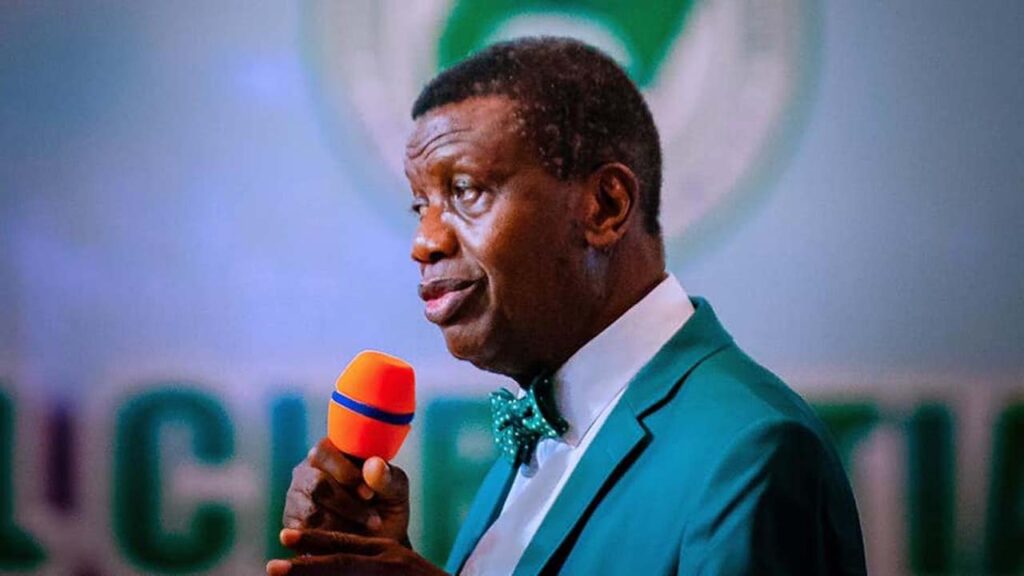The General Overseer of the Redeemed Christian Church of God (RCCG), Pastor Enoch Adeboye, has called on the Federal Government to take swift and decisive action against terrorists and their sponsors amid growing international concern over insecurity and alleged religious persecution in Nigeria.
Speaking during the November Holy Ghost Service on Friday, Pastor Adeboye advised President Bola Ahmed Tinubu to give the nation’s newly appointed service chiefs a three month ultimatum to eradicate terrorism and dismantle the financial networks sustaining insurgent groups.
“This is not the time for apportioning blame. Our President inherited this problem — it started before him,” Adeboye said. The respected cleric warned that if the United States were to take unilateral military action in Nigeria, global powers such as China and Russia would not come to the country’s defence, adding, “They would only talk.”
Trump Raises Alarm Over Christian Persecution
Adeboye’s comments follow recent remarks by U.S. President Donald Trump, who, in a post on his Truth Social platform last week, alleged that “Christianity in Nigeria is facing an existential threat” from extremist elements.
Trump vowed that the United States “cannot stand by while such atrocities are happening,” promising that his administration would be “ready, willing, and able to protect our great Christian population around the world.”
He also instructed Congressman Riley Moore and House Appropriations Committee Chairman Tom Cole to investigate the matter and report back to him.
U.S. Congress Moves Resolution on Nigeria
In a related development, Congressman Riley Moore on Friday introduced a resolution in the U.S. House of Representatives condemning the alleged persecution of Christians in Nigeria and expressing support for President Trump’s stated intention to address the crisis.
The resolution, titled “Condemning the persecution of Christians in Nigeria and standing ready to support President Donald Trump in taking decisive action to end the existential threat that persecuted Christians face in Nigeria,” was referred to the appropriate committee for deliberation.
Moore, who also chairs the investigative committee set up by Trump, described Nigeria as “the deadliest place in the world to be a Christian.”
He claimed that over 7,000 Christians have been killed in 2025 alone, averaging 35 deaths daily, and that between 50,000 and 100,000 Christians have been killed since 2009.
According to him, 19,000 churches have been destroyed, while millions of people have been displaced in what he called “a deliberate campaign of religious cleansing.”
Nigeria Under Scrutiny
Moore cited a string of attacks allegedly targeting Christian communities, including the 2022 Pentecost massacre, the 2023 Christmas Eve massacre, and the 2025 Holy Week attacks. He also referred to the murder of Fr. Sylvester Okechukwu on Ash Wednesday earlier this year, describing the incidents as “targeted jihadist attacks” rather than random violence.
He accused the Nigerian government of failing to respond effectively or hold perpetrators accountable.
“Last month, a pastor in Plateau State warned of an impending Fulani attack. The Nigerian Army accused him of spreading fake news, and more than a dozen Christians were killed the next day,” Moore alleged.
Moore also faulted President Tinubu for downplaying claims of religious persecution, quoting his September 2025 statement that “there’s no religious persecution in Nigeria.”
“He now has an opportunity to deepen and strengthen Nigeria’s relationship with the United States and, more importantly, do the right thing,” Moore added.
Read Also: Nigeria’s deputy senate president, northern groups condemn Trump’s threat over killings
Pastor Adeboye’s warning has since drawn wide attention from both religious and political circles. Analysts say his remarks reflect growing anxiety over Nigeria’s security situation and its potential international implications.
Many observers have urged the Federal Government to demonstrate stronger political will, restructure the nation’s counter-terrorism strategy, and address religious tensions to prevent foreign intervention in domestic affairs



